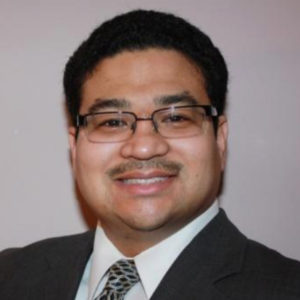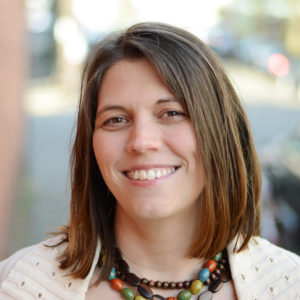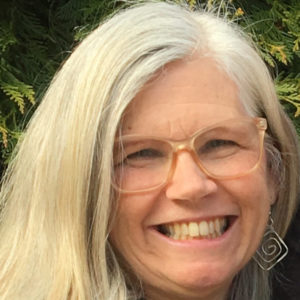Self-Compassion / Tending to the self through vulnerability, especially around needs, shame, and pain.
What does flourishing leadership look like in the real world? Resilient Leaders Project asked alumni of The Seattle School of Theology & Psychology about how they’ve flourished while creating contextually-responsive ministry. In listening to these leaders, we found six common themes–practices and ways of being that other leaders can apply to increase their own flourishing. This blog series will share those themes, one at a time, through the stories of flourishing leaders. To see the other themes and leader profiles, read the Flourishing in Service Report. This week’s theme is self-compassion: leaders need to give themselves grace and permission to be fully human.
 Wakaki Thompson
Wakaki Thompson
The Allender Center, Training Certificate 2018—2019
Reverend and Computer Systems Architect
I hope to flourish in the tension of love, disappointment, hurt and joy. I see flourishing as a mutual–but not transactional–relationship with peaks and valleys. It’s asking my neighbor more thoughtful and deeper questions to sufficiently attune to them; it’s seeking their story to better understand their development and the critical people in their lives. I would hope to see myself in their brokenness and rehearsed behaviors, so this mutual identification could help provide a shared grace and mercy for bonded neighborly connection. If we can relate with others as mysteriously and supernaturally as described, to intimately and spiritually connect with others in a series of moments, I believe that to be Christlike.
To engage myself deeply and intimately is a challenge. I have developed a superhero persona and often suppress my feelings. I was taught to power through situations and to leverage logic over emotions. I was taught to look out for myself and to be the center of my decision tree. I was taught relationships should have a checklist and meet certain criteria.
However, past midlife, I am challenged to change who I am to be more like Christ. I’m challenged to reveal my pain, trauma, and brokenness, to realize that this does not make me weaker but in reality, makes me stronger and more worthy of trust and connection with others. I should not have to shoulder all the load when we as a community can bear it together more honestly. Being a superhero is not healthy or realistic. Having the strength to point to God is sufficient and embodies a more sustaining joy.
 Suzanne Aultman
Suzanne Aultman
MACP, 2016
Structural Engineer
As a structural engineer who supervises several others, I am constantly juggling the demands on my time from others across all departments. My hope is to see each person and to know them beyond the role they fulfill at our company. If I can remember something specific about them to ask about or to acknowledge, maybe they will feel seen. It is in the small moments of seeing the other that we tend to have the most impact and sometimes not even realize it.
Something my time at The Seattle School helped me refine was my ability to read a situation – to recognize when there is something deeper happening in an interaction. When I notice that something else is happening, I begin asking myself questions to determine how much I should engage it in the moment. Kindness is both acknowledging what you see in a person while also knowing when it is not the most appropriate time to name it, especially in a corporate environment. It is always a judgment call – sometimes I’m right and sometimes I’m wrong. I do not sit in shame for failing; instead, it pushes me to pay better attention to those around me and to respond when I notice a need. For the moments I happen to notice and engage, there is a reward in the connection with the other that encourages me to keep going.
Also, being a community, this is not a one-way interaction. I must be willing to be able to speak my needs so that others can respond to me and offer to me where I am lacking. It is in the giving and receiving that we can all grow and flourish together.
 Ruth Wiley
Ruth Wiley
MACP, 2016
Counselor
Two challenges to my flourishing are shame and overcommitment. Shame inhibits flourishing by not allowing psychic space for creativity to thrive, thus limiting how I share my gifts with the world. Overcommitment, which can be subtly fueled by shame, reduces the quality of my presence and work. The irony of both of these self-protective postures is that we try to hide the parts of ourselves that we deem unlovable and so we do not allow the gaze of compassionate others to reframe who we are in a fuller more nuanced way. I feel shame, so I do not want you to see me more fully for fear that you will deem me unworthy too. But when I can love the aspects of me that are “ugly,” the roots that support flourishing for self and others can authentically grow deeper into love.
I address these challenges through growing self-compassion. I believe that Jesus was the most self-compassionate person to live. It was because of his deep care and compassion for himself that he was able to love others so disruptively well. When I first began meditative centering prayer, I could not imagine being able to honestly say to myself Brene Brown’s now-famous sentence: “I am worthy of love and belonging.” As I avidly continued my contemplative practice, my own therapy, my academic pursuits and my engagement with my community, something changed where my chest cavity meets my thoughts and words are formed. One morning while lying on my floor in our attic apartment in Seattle, I, like C. S. Lewis, was surprised by joy: “Oh my God I am worthy of love and belonging.” Coming to love myself is and will be my leadership crucible. Love is what God is and is doing.
Learn more about Resilient Leaders Project and the Certificate in Resilient Service.


